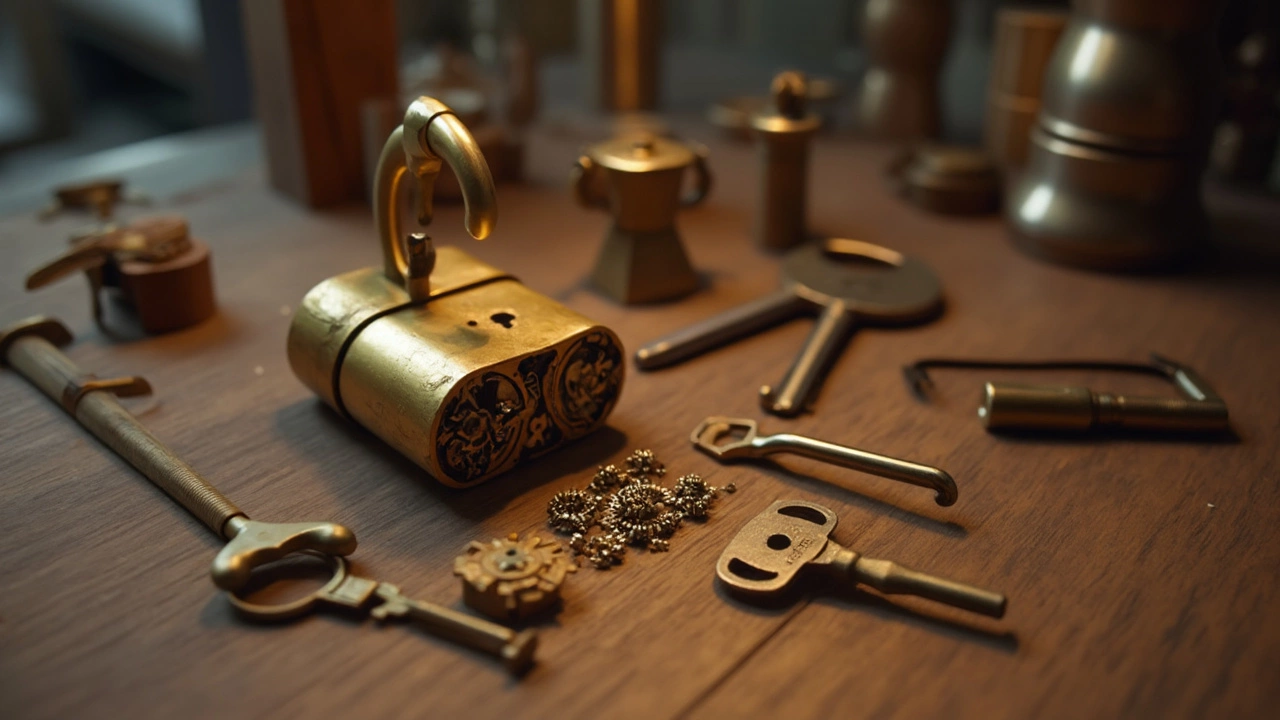So, you lost your keys again, huh? Don't worry, you’re not alone, and it might not be as big a disaster as it seems. Many people wonder if a locksmith can whip up a new key just by fiddling with the lock. The short answer? Yep, they can.
Locksmiths have this nifty trick up their sleeves. They study the lock’s insides—like the pins and tumblers—and figure out exactly what sort of key would fit. It’s not magic, but it is a bit like solving a puzzle. Skilled locksmiths can do this using a variety of tools, some which might remind you of a mix between a dentist's tools and a spy kit.
- Understanding the Lock Mechanism
- The Art of Key Creation
- UK Locksmithing Techniques
- Training in India for Locksmithing
Understanding the Lock Mechanism
Alright, let’s dive into the heart of things—how a lock actually works. Most folks just see a lock as something that keeps their stuff safe. But beneath that shiny exterior lies a little world of mechanics. To craft a new key without an original, the locksmith first needs to understand this mechanism.
At the core of many locks, especially in the UK, is the pin tumbler system. Ever peeked inside a lock and wondered what's going on? It’s mostly little pins of different lengths. These pins are placed inside a cylinder, and they align to specific heights when the right key goes in. When aligned just right, the cylinder turns, and voila, the lock opens.
For a locksmith, getting these pins to line up without the original key involves finesse. The pro will often use a technique called "impressioning" where they insert and turn a blank key to create tiny marks. These marks then guide them in cutting the key exactly to the needed shape.
Here's a quick look at a basic pin tumbler breakdown:
| Component | Function |
|---|---|
| Plug | Rotates with the key when pins align, opening the lock. |
| Pins | Varying lengths to match specific keys. |
| Spring | Keeps pins in place, ready to pop back and move out of the way for the right key. |
Understanding these bits isn’t just essential for creating keys, but also for anyone wanting to train as a locksmith in India or elsewhere. That's because having a handle on how locks work is foundational to the trade.
The Art of Key Creation
Alright, let's dive into how the magic happens. Crafting a key from a lock isn’t just about having the right toolkit; it's a bit of an art form. Picture this: you're standing there with nothing but the lock itself, and somehow, you need to produce a key that fits like a glove. That's where a locksmith comes in, with all their skill and experience.
The first step is getting familiar with the lock. A locksmith will usually start by peering into the keyhole to understand its insides—the pins or tumblers, depending on the lock type. This provides clues about the key they need to create. Think of it as reading a lock's diary but with fewer secrets and more springs.
Locksmiths often use a tool called a blank key—a kind of blank slate for their artistry. They'll insert this blank into the lock and apply light pressure while 'jiggling' it. This process is called impressioning, and it leaves tiny marks on the blank key from contact with the lock’s pins. These marks guide the locksmith in shaping the key further.
Next comes the 'grooming' phase where locksmiths manually file the blank key based on these impressions. This process can take a bit of patience and a lot of skill, but when done right, the key smoothly rotates, unlocking the door.
Sensing this might still sound a bit like wizardry, check this out: some experienced locksmiths can even make a key without any test fits just by perfecting this technique. Impressive, right?
For anyone in the locksmith training field in India or aspiring to start, mastering this art can be a real game-changer. This skill not only helps in emergencies but also reinforces a locksmith's position as a trusted problem-solver in their community.

UK Locksmithing Techniques
Locksmithing in the UK has its unique flair. It’s not just about a locksmith crafting a new key from a lock; it’s about mastering local lock varieties that you might not find elsewhere. British locks, like the famous Chubb lock, have been setting high security standards since the 19th century.
In the UK, one of the most common locks is the mortice, especially the five-lever version which is often insurance-approved. A locksmith needs to understand these locks' specifics to create precise keys. No two locks are the same, and that’s where UK locksmiths shine with their attention to detail.
UK locksmiths often rely on impressioning, a technique that involves inserting a blank key into the lock to leave marks which guide the key's creation. Other tools include decoder picks, designed to measure the positions of pins in a lock without dismantling it. The goal is to create a key that moves through the lock as smoothly as a factory original.
- Impressioning: Creating a blueprint from the lock directly.
- Picking Sets: Used to unlock or read the lock mechanism.
- Decoder Picks: Non-invasive tools to understand a lock’s anatomy.
- Key Cutters: Machines that physically shape the new key.
In the UK, most locksmiths also have to comply with the vetting standards, often involving a DBS check. This ensures they’re trusted professionals when they arrive to help. So, whether it's a Victorian-era masterpiece or a modern-day lock, UK locksmiths are trained to handle them all with flair and precision.
Training in India for Locksmithing
If you’re eyeing a career in locksmithing, India’s got some interesting avenues to explore. It's not just turning keys and opening locked doors—there's more to it, like learning about security systems, safes, and the whole nine yards. You’ll find courses tailored to different levels of expertise, from beginners to those looking to master the craft.
In India, institutions like the Indian Institute of Locksmithing offer structured programs. These usually cover a wide range of topics, starting with the basics of key making and lock mechanisms. Expect a mix of classroom learning and practical sessions where you’ll get to handle real tools and locks. Some courses even delve into electronic locks and alarm systems, which are becoming more popular in homes and businesses.
Here's a quick glimpse of what you might encounter in a typical locksmith training program:
- Introduction to traditional and modern locks
- Hands-on training with tools for cutting keys and lock installation
- Advanced topics in safe and security systems
- Insights into the UK locksmithing market, focusing on lock standards and customer service
What makes these training programs so valuable is the emphasis on real-world applications. Imagine troubleshooting a complex locking system in a high-stakes situation. With the right training, you could handle it with confidence. Plus, having a credential from a recognized institute can seriously boost your credibility in the field.
So, if you’re willing to put in the effort, this could be a solid path. Whether you want to work in the local market or dream of becoming a locksmith in places like the UK, getting trained in India is a step in the right direction.



